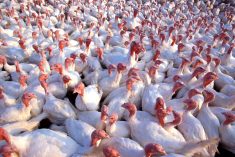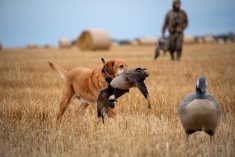A hog nursery operation in Quebec’s Monteregie was confirmed Dec. 31 as the province’s third case of porcine epidemic diarrhea (PED) in hogs.
Quebec has previously booked two cases of on-farm outbreaks of the PED virus (PEDv) — both at hog finishing operations in the Monteregie in February and November 2014 respectively.
The latest case brings Canada’s total of on-farm PEDv infections in hogs to 77 since the virus was first confirmed in southern Ontario last January, including 69 in Ontario, four in Manitoba and one in Prince Edward Island.
Read Also

Mexico agriculture secretary says still no date for restarting cattle exports to U.S.
Mexican Agriculture Minister Julio Berdegue said on Wednesday that Mexico and the United States have not yet set a date to resume Mexican cattle exports amid an outbreak of the flesh-eating screwworm parasite.
PEDv is believed to spread more readily during the winter, although just seven of Canada’s 77 cases have been confirmed since the beginning of November, including the two in Quebec and five in Ontario.
The most recent Ontario case was confirmed Dec. 23, at a farrow-to-wean operation in the Waterloo region.
In the U.S., where the virus first appeared in April 2013, over 9,300 on-farm cases of the virus have since been confirmed across more than 30 states. It’s estimated PEDv has killed at least eight million U.S. hogs.
While the virus can sicken hogs of any age, mortality rates are usually at or near 100 per cent in infected newborn and unweaned piglets. Symptoms include severe diarrhea, dehydration, vomiting and loss of appetite in infected hogs.
Quebec’s agriculture and food ministry again emphasized in its latest notice on PEDv that the virus is not known to spread to humans or other animal species, and does not pose a food safety risk. — AGCanada.com Network












